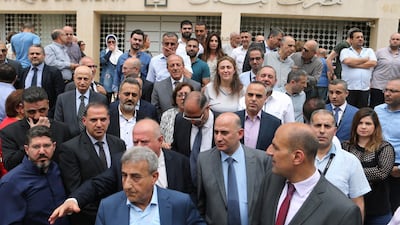The Beirut Stock Exchange remained closed on Tuesday despite central bank employees announcing they had suspended their two-day strike to protest the government’s alleged plans to cut their salaries by 25 per cent.
After holding a general assembly on Tuesday morning, the union of employees of the Banque du Liban (BDL) announced that it would suspend the strike until Thursday evening, the state-run National News Agency (NNA) reported.
In a press release, union leader Abbas Awada said that “as a result of our patriotism and feeling of responsibility towards the Lebanese society and the economy, (we) decided to suspend the strike for three days. We will meet again on Friday morning to determine the course of the strike and to decide whether to continue with an open-ended strike, or to end it”.
BDL employees are waiting to see how discussions regarding the 2019 budget, which contains austerity measures, develop.
The cabinet is expected to finish working on it by Friday and will then send it to parliament for approval.
This is the first time the 850 employees of the BDL have gone on strike since the central bank was created in 1963, Mr Awada told The National on Monday.
They fear that the draft budget includes provisions which will cut their wages by a quarter, or worse.
“We are ready to cancel the strike if there are positive developments. That means the cancellation of articles 60 and 61 or the exclusion of the central bank from these articles”, said Mr Awada, according to the press release.
Article 60 of the budget allows the Ministry of Finance to increase control on public entities that function independently from the government such as the Beirut port, the regie tobacco company, and the wheat silo directorate, economic expert Jean Tawilé, who read the first version of the draft budget, told The National.
At the end of article 60, suspension points have been added, giving the impression that the BDL could be included, he said.
The central bank operates independently from the government but must submit a financial report to the Finance Ministry, which collects 80 per cent of its earnings every year.
Article 61 of the budget cancels bonuses and additional wages of employees of these public entities, including the central bank, Mr Tawilé added.
That would affect BDL employees’ annual salary. Currently, it is equivalent to 16 months of wages, but that would be reduced to 12 months. Commercial banks follow the same practice.
Additionally, article 54 states that central bank employees cannot earn more than the country’s president, the equivalent of 12.5 million Lebanese Pounds ($8,200). The union of BDL employees probably did not refer to this article as it only affects high earners, suggested Mr Tawilé.
The governor of the central bank, Riad Salameh, told employees that their salaries and rights would not be affected by the new budget, according to the employees’ press release.
“The alternative currently under discussion would be that the central bank simply increases monthly wages so that they do not change despite the new budget cancelling additional wages,” Mr Tawilé said.
The government has implicitly criticised the BDL strike. On Monday night, Information Minister Jamal Jarrah read a statement after the cabinet’s fifth budget meeting saying that they had discussed “ongoing strikes and demonstrations which are mostly based on false information that was not discussed by the Cabinet”.
“The council of ministers wants to clarify that information that has been “leaked” is incomplete and baseless, misleads public opinion and does not serve the interest of the nation nor of its citizens,” Mr Jarrah added.
There have been several strikes these past few weeks organised by public servants and retired military personnel protesting salary cuts.
The unprecedented BDL strike is the one that has caused most disruption until now, leading to the shutdown of the Beirut Stock Exchange on Monday.
Its website showed no activity on Tuesday. An anonymous source told Lebanese television network LBCI on Tuesday morning that trading was still suspended because of "technical reasons" linked to the strike at the BDL.
The source said that trading would resume once “work had returned to normal at the central bank”.
The impact of its closure on the Lebanese economy is limited as there are only 10 companies listed on the Beirut Stock Exchange, which has a market capitalisation of close to $9 billion.
However, the strike of the central bank’s employees significantly curtailed the activity of commercial banks, delaying the clearing of checks, and blocking foreign currency exchange and international transfers.
To avoid a shortage of liquidity should the strike continue, several banks limited cash withdrawals on Monday, causing worry among the Lebanese, two bankers told The National. Limits were set between $2,000 and $5,000.
“My friends have been able to withdraw money these past few days, but I have been told I should take 300,000 Lebanese pounds ($200) out to have cash for the rest of the week just in case the strike continues,” said one person, speaking before the suspension of the strike was announced.
A currency exchange bureau employee told The National that he had noticed a significant increase in clients requesting dollars in the past 10 days since strikes started.
One banker who requested anonymity said that the BDL strike caused “mild panic” among his clients. Some of them asked to withdraw tens of thousands of dollars on Monday, a request he had to refuse because of the withdrawal cap.
But he said that banks were back to “business as usual” on Tuesday.
“But we are worried that the strike might start again now that we’ve seen the problems it causes,” the source said.

